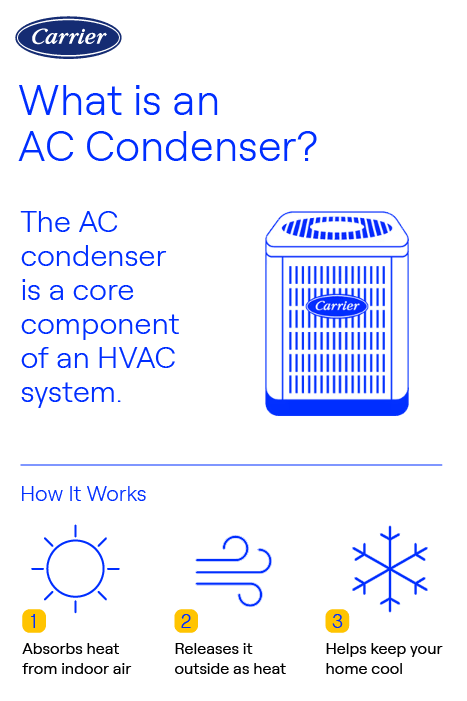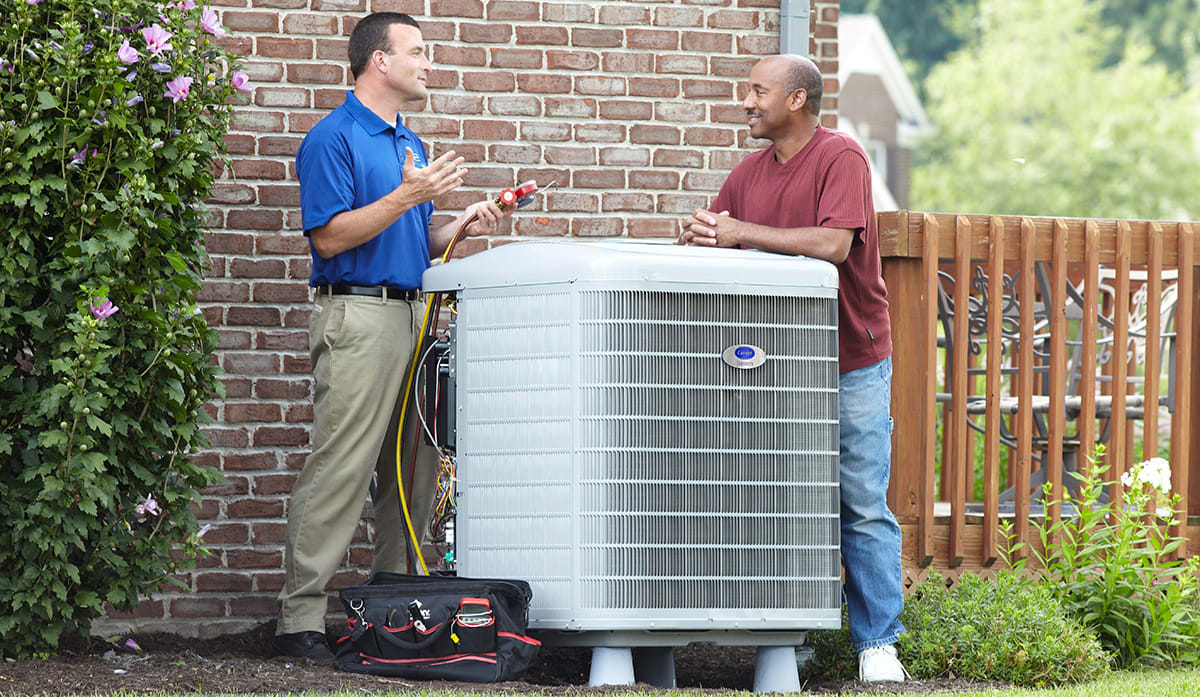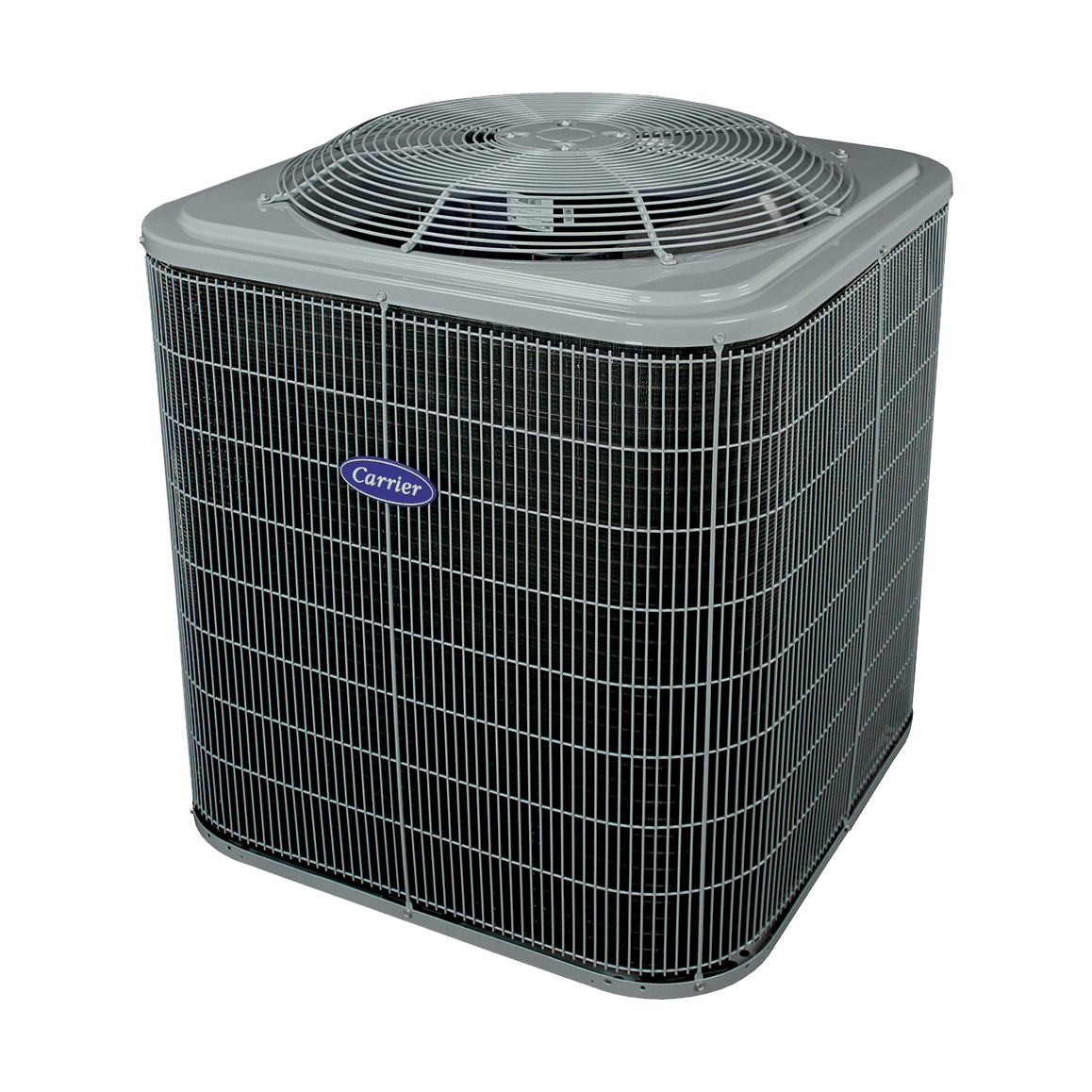Understanding Your AC Condenser Unit
What is an Air Conditioner Condenser?

An AC condenser unit is a critical component of your home's HVAC system. It removes heat from the indoor air to cool your home efficiently. By understanding the basics of an air conditioner condenser, you can make informed decisions about your cooling needs.
How Does an AC Condenser Work?
An A/C condenser unit is a vital part of a cooling system that maintains a comfortable indoor environment. It works by releasing heat from the refrigerant, allowing it to return to a liquid state and complete the cooling cycle. Located outside of the home, it works alongside components like the compressor and evaporator coil to cool your indoor space.
When the refrigerant, which absorbs heat from indoor air, reaches the condenser, it enters as a hot gas. The air conditioning condenser facilitates heat transfer from the refrigerant to the outside air using a series of coils and fins that maximize surface area for efficient heat dissipation. Learn more about how does air conditioning work .

What is the Purpose of the AC Condenser Unit?
The AC condenser unit is crucial for maintaining desired indoor temperatures and removing heat from the refrigerant. Without a functional condenser, the cooling system would struggle to provide effective cooling, leading to discomfort and reduced efficiency.
Jennifer Fletcher, owner of Modern Air Solutions in Gurnee, Il, breaks down the purpose of the condenser unit in an HVAC system.
“The condenser unit is the part of the system that removes heat from inside the home and releases it outdoors,” Fletcher said. “If you place your hand over the top of the condenser while it’s running, you’ll feel the heat being expelled.”

How Much is an AC Condenser?
Where to Buy an AC Condenser Replacement
Types of Heat Pump and HVAC Condensers
Carrier offers a diverse lineup of heat pump and air conditioner condensers tailored to meet your specific needs. Let's explore the different types of condensers:
- Split system air conditioner condensers: These are the most common in residential settings, consisting of an outdoor unit and an indoor unit. The outdoor unit houses the condenser coil, compressor, and fan, while the indoor unit contains the evaporator coil. Together, they cool and distribute air throughout your home.
- Packaged AC condensers: Ideal for homes with limited indoor space or those preferring a compact design, packaged HVAC systems combine all the components of a split system into a single outdoor unit. They are typically installed on rooftops or on the ground outside the home.
- Heat Pump condensers: Offering both cooling and heating capabilities, heat pumps use advanced technology to extract heat from the outdoor air during winter and release it inside your home. In summer, the process reverses to remove heat from your indoor space. Heat pump condensers are an energy-efficient option for year-round comfort. Learn more about how does a heat pump work .

How Do I Know if My AC Condenser is Bad?
A sign of a bad AC condenser is warm air blowing from vents despite the AC running, which indicates the condenser isn’t cooling effectively. You might also hear unusual noises, like grinding or rattling, from the outdoor unit, often caused by fan or motor issues. Leaks or visible corrosion on the condenser coils are also warning signs. Lastly, frequent cycling (turning on and off) or increased energy bills suggest your condenser may be struggling to maintain efficient cooling.Common AC Condenser Issues That Can Cause it to Go Bad
- Dirty Condenser Coils:
- Symptoms: Reduced cooling efficiency, higher energy bills, and the unit running constantly without adequate cooling.
- Solution: Clean the coils regularly to remove dirt, debris, and dust buildup, improving heat exchange efficiency.
- Frozen Evaporator Coils :
- Symptoms: Reduced airflow, warm air blowing from vents, and ice buildup on the coils.
- Solution: Check air filters, ensure proper airflow, and thaw the coils. If needed, call your local Carrier dealer to check refrigerant levels and inspect the thermostat for malfunction.
- Failing Compressor:
- Symptoms: AC fails to cool, strange noises, or the system not turning on.
- Solution: If the compressor fails, it often requires professional replacement or repair due to its complexity and cost.
- Refrigerant Leaks:
- Symptoms: Warm air from the vents, a hissing sound, or a decline in cooling performance.
- Solution: Your local Carrier dealer should repair the leak and recharge the system with the correct amount of refrigerant.
What Happens When Your AC Condenser Goes Out?
When your AC condenser goes out, the system cannot effectively release heat absorbed from indoors. This leads to warm air blowing from vents, reduced cooling efficiency, or the AC unit not running at all. Talk to your local Carrier dealer for a thorough evaluation of the issue.
Choosing the Right Air Conditioner Condenser Unit
Selecting the appropriate air conditioner condenser involves several crucial factors that can significantly impact your cooling system's efficiency and performance. Understanding these factors will help you make an informed decision.
What size condenser do I need?
One key consideration is the proper sizing of the A/C condenser unit. An undersized unit may struggle to cool your space effectively, increasing energy consumption and potential wear and tear. Conversely, an oversized unit may cycle on and off frequently, leading to inefficient operation and a shorter lifespan. Consulting with your local Carrier dealer can ensure accurate assessment of your cooling requirements and recommend the appropriate size for your AC condenser.
What energy efficiency should I look for in an AC condenser unit?
Energy efficiency ratings are also vital in selecting an AC condenser unit. These ratings, measured by the Seasonal Energy Efficiency Ratio 2 (SEER2) , indicate how efficiently the unit converts electricity into cooling output. Higher SEER2 ratings signify greater energy efficiency and lower utility bills.
By considering proper sizing and energy efficiency ratings, you can choose the right AC condenser unit to meet your cooling needs. Carrier offers a range of high-efficiency heat pump and air conditioning condensers designed to provide reliable, energy-efficient performance. Your local Carrier dealer can provide advice and top-quality products that enhance your home's comfort and efficiency.

Frequently Asked Questions About AC Condensers
Explore Carrier Air Conditioners
Carrier air conditioners are known for their reliability, energy efficiency, and advanced technology. With a range of models to suit different needs, Carrier offers solutions with optimal comfort and air quality. Whether you're looking for a budget-friendly option or a high-end, energy-efficient unit, Carrier’s air conditioners provide consistent performance, quiet operation, and innovative features.
Built to handle tough coastal air. Up to 18.5 SEER2 for enhanced energy savings with enhanced comfort features. Features InteliSense™ technology.
Up to 16.5 SEER2 for enhanced energy savings with standard comfort features.
FREQUENTLY ASKED QUESTIONS & TIPS FOR AIR CONDITIONERS
- Find a Carrier Air Conditioner Expert in your area
- Air Conditioner Maintenance Tips
- Air conditioner price; How much does it cost?
- Help with Air Conditioner Service
- Find Out How Do Air Conditioners Work
- Wondering "What Size Air Conditioner Do I Need?"
- What air conditioner temperature you should set your thermostat to.
- Troubleshoot an Air Conditioner tips
- Learn about Air Conditioner Coil Cleaning
- Tips to Unclog Air Conditioner Drain Line
- Factors and variables - "How Long Do Air Conditioners Last?"
- Learn about Air Conditioner Filters
- How Often to Change AC Filter
- Learn How to Change Air Conditioner Filters
- Why is my AC Fan Not Working?
- Is your Air Conditioner Not Cooling?
- Why should a get an AC Tune Up
- Have hot or cold spots in your home? Consider installing a ductless mini split
- What is a split air conditioning system?
- Is air conditioning bad for the environment?
- What is a heat pump?
- Browse heating and cooling products
- Browse air conditioning systems
- Best temperature for AC
- What temperature should I set my thermostat




